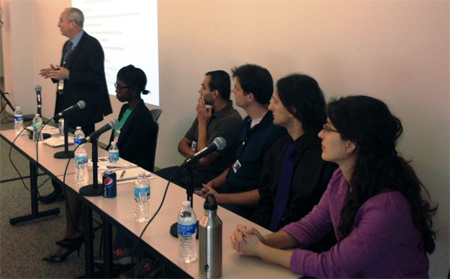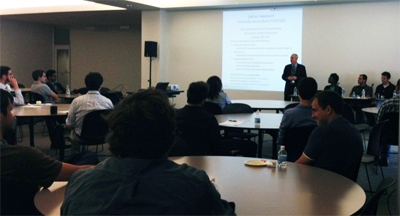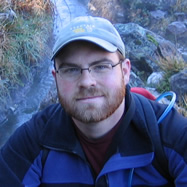With Ted Flynn (BIO), Director’s Postdoctoral Fellow
 This past September, postdocs celebrated National Postdoctoral Appreciation Week with a special Open Forum with the Laboratory Director. The Postdoctoral Society of Argonne (PSA) led a discussion on Mentoring with Director Eric Isaacs and Gender Diversity Specialist Erin Thomas.
This past September, postdocs celebrated National Postdoctoral Appreciation Week with a special Open Forum with the Laboratory Director. The Postdoctoral Society of Argonne (PSA) led a discussion on Mentoring with Director Eric Isaacs and Gender Diversity Specialist Erin Thomas.
Some of the themes the event touched on included:
- The meaning of mentoring
- The benefits of mentoring
- How do postdocs use the Mentoring Program
The PSA illustrated these themes by reviewing the criteria for the Outstanding Postdoctoral Supervisor and Outstanding Postdoctoral Mentor Awards. To gain a better perspective on what qualities postdocs look for in a good mentor and supervisor, read the original call for nominations.
 The audience offered suggestions on how to strengthen the Mentoring Program and establish a mentoring culture at the laboratory. The major take-away from the forum was that periodic communications on the Mentoring Program will help clarify expectations for postdocs and mentors.
The audience offered suggestions on how to strengthen the Mentoring Program and establish a mentoring culture at the laboratory. The major take-away from the forum was that periodic communications on the Mentoring Program will help clarify expectations for postdocs and mentors.
Some postdocs were unaware that they can select another mentor as they meet more people at the laboratory. Postdocs could also use more resources and support so they can make the ideal mentor-mentee pairing early in the appointment.
Through the discussion, postdocs echoed an observation from the recent Postdoc Climate Survey — most postdocs at the laboratory are receiving valuable career advice, but may be doing so through a variety of avenues. Many postdocs could benefit from specific guidance on what topics they could address with their mentors to get the most out of the relationship. The PSA is already on top of the suggestions that were offered and postdocs can expect to see more in 2014.
Ted Flynn (BIO), a Director’s Postdoctoral Fellow from 2011-13, was on hand to contribute to the discussion. Ted has moved on to the next stage of his career and in doing so, shares his insights with us on how we can tackle some of the challenges—while enjoying the benefits—of a formal mentoring program.
1. Tell us about your Argonne appointment—you started here as a Director’s Fellow—what did you think of that experience? What was your research focus and what did you learn from it? What are you doing now?
 My experience as a Director’s Fellow was quite positive. I joined Ken Kemner’s group in the Biosciences Division to study how microbial activity affects the biogeochemistry of the subsurface environment. In particular, we are interested in how certain types of microbial metabolism control the solubility of metals like iron and uranium. As a Director’s Fellow, I was able to work closely with Dr. Kemner to integrate myself into existing projects while still building my own research.
My experience as a Director’s Fellow was quite positive. I joined Ken Kemner’s group in the Biosciences Division to study how microbial activity affects the biogeochemistry of the subsurface environment. In particular, we are interested in how certain types of microbial metabolism control the solubility of metals like iron and uranium. As a Director’s Fellow, I was able to work closely with Dr. Kemner to integrate myself into existing projects while still building my own research.
To me, the best part of the Director’s Fellow program is that it gave me flexibility in designing and pursuing projects that interested me while still allowing me to integrate with an established research group.
After my two years as a Director’s Fellow, in October I took a position as a research scientist with the Computation Institute at the University of Chicago while maintaining a joint appointment with Argonne. This has been a fantastic experience so far and has allowed me to continue with some existing projects as well as begin new ones. In particular, I work more closely with the Institute for Genomics and Systems Biology in using the power of metagenomics to understanding biogeochemical cycling.
2. What was your impression of mentoring prior to arriving at Argonne?
I have always felt mentoring is extremely important, and have sought out mentors at all levels of my education. Prior to arriving at Argonne, this was done on an informal basis. I often sought out the advice of professors and more senior graduate students and asked them about their experiences in becoming scientists. There are many paths that lead to a career in science and hearing about other’s experiences helps shed light on one’s own challenges.
3. What do you think postdocs should know about the mentoring program and how can the laboratory best communicate about it?
Postdocs should be as proactive as possible when it comes to developing mentoring relationships. Simply filling the minimum quota of visits with your assigned mentor won’t get you the help or direction you need. Simply having someone to talk to can be very helpful, especially if you’re in a difficult situation, but what you really need is a mentor who is also an advocate. I was lucky in that my primary mentor was also my supervisor. Ken made sure my research was visible to laboratory management and helped me understand what I needed to do to build a career at Argonne. His advice and advocacy was invaluable to me, and led directly to my current position.
4. How would you like to see mentoring deepened at the laboratory?
I would like to see a mentoring office be created independently from the divisions. This would allow postdocs to seek out advice on their own without having to go through the typical chain of command.

